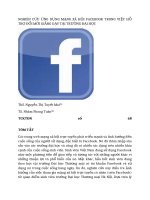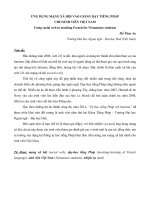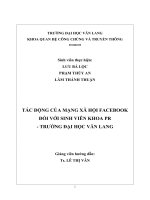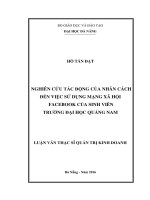DẠY HỌC NGOẠI NGỮ BÊN NGOÀI LỚP HỌC - ỨNG DỤNG MẠNG XÃ HỘI FACEBOOK TRONG DẠY VÀ HỌC TIẾNG ANH
Bạn đang xem bản rút gọn của tài liệu. Xem và tải ngay bản đầy đủ của tài liệu tại đây (1.32 MB, 10 trang )
<span class='text_page_counter'>(1)</span><div class='page_container' data-page=1></div>
<span class='text_page_counter'>(2)</span><div class='page_container' data-page=2>
<i> </i>
T¹p chÝ Khoa häc và Công nghệ
S ĐẶC BIỆT CHÀO MỪNG KỶ NIỆM 10 NĂM THÀNH LẬP
KHOA NGOẠI NGỮ - ĐẠI HỌC THÁI NGUYÊN (2007 – 2017)
Môc lôc
Trang
TS. Lê Hồng Thắng - Bàn về dạy-học ngoại ngữ qua đề án dưới góc độ của giáo học pháp 3
Nguyễn Thị Như Nguyệt, Chu Thành Thúy - Đánh giá năng lực đầu ra tiếng Nga của sinh viên trình độ
A2-B1 theo khung tham chiếu chung châu Âu tại Khoa Ngoại ngữ - Đại học Thái Nguyên 7
Nguyễn Thùy Linh - Kiểm tra đánh giá trong giảng dạy các môn đề án ngôn ngữ - một số chia sẻ từ thực tế 13
Vũ Thị Thanh Huệ - Nhận thức của sinh viên đối với khóa đọc mở rộng trực tuyến với sự trợ giúp của mạng xã
hội Edmodo 19
Mai Thị Thu Hân, Nguyễn Thị Liên, Hoàng Thị Tuyết, Dương Thị Ngọc Anh - Tăng cường tính tự học bằng
dự án học tập - nghiên cứu tình huống tại trường Đại học Hoa Lư 25
Dương Đức Minh, Dương Lan Hương - Nghiên cứu về sự tương tác giữa người thuyết trình và khán giả khi học
<i>kỹ năng thuyết trình của sinh viên chuyên ngành tiếng Anh tại Khoa Ngoại ngữ - Đại học Thái Nguyên </i> 31
Phạm Thị Kim Uyên - Sử dụng nhật ký trong dạy biên dịch cho sinh viên chuyên ngữ Đại học Nha Trang 37
Lê Thị Hồng Phúc - Phản hồi của sinh viên về dự án TV show lấy điểm cuối kỳ trong khóa ngữ âm 43
Hán Thị Bích Ngọc - Dạy học ngoại ngữ bên ngoài lớp học - ứng dụng mạng xã hội facebook trong dạy và học
tiếng Anh 49
Nguyễn Ngọc Lưu Ly, Quách Thị Nga - Vài nét về việc sử dụng truyền thông đa phương tiện trong giảng dạy
tiếng Trung Quốc trình độ sơ cấp tại Khoa Ngoại ngữ - Đại học Thái Nguyên 55
Lê Thị Hòa, Đậu Thị Mai Phương - Nâng cao kỹ năng thế kỷ 21 trong học tiếng Anh chuyên ngành thông qua
dự án 61
Nguyễn Thị Bích Ngọc, Trần Minh Thành - Phương pháp gia tăng hiệu quả của đề án tạp chí tiếng Anh trong
việc học viết cho sinh viên chuyên ngành tiếng Anh tại Khoa Ngoại ngữ - Đại học Thái Nguyên 67
Hoàng Thị Huyền Trang, Nguyễn Thị Ngọc Anh - Phát triển khả năng đọc hiểu tiếng Anh cho sinh viên ngoại
ngữ thông qua các bài đọc có nội dung bao hàm yếu tố văn hóa phù hợp 73
Nguyễn Quốc Thủy,Nguyễn Thị Đoan Trang - Dạy - học ngoại ngữ qua đề án tạp chí tại trường Đại học Sư
phạm – Đại học Thái Nguyên 79
Nguyễn Tuấn Anh - Thiết kế tổ chức dạy học mơn báo chí trực tuyến theo hướng học ngôn ngữ qua dự án như
một cách đảm bảo tính đa ngành của chương trình đào tạo 85
Đỗ Thị Sơn, Đỗ Thị Phượng - Nghiên cứu phân tích lỗi sai của sinh viên Khoa Ngoại ngữ - Đại học Thái
Nguyên khi dịch trực tiếp từ Hán Việt sang tiếng Trung Quốc và giải pháp khắc phục 91
Trần Đình Bình - Ứng dụng phương pháp dạy học qua dự án trong dạy học ngoại ngữ ở Việt Nam 97
Lê Thị Khánh Linh, Lê Thị Thu Trang - Phương tiện biểu đạt thái độ của người kể chuyện trong các chương
<i>trình talk show của Mỹ và Việt Nam </i> 103
Đỗ Thanh Mai, Phùng Thị Thu Trang - Ứng dụng Moodle trong dạy và học trực tuyến học phần tin học đại
cương tại Khoa Ngoại ngữ - Đại học Thái Nguyên 109
Mai Thị Ngọc Anh, Vi Thị Hoa, Phạm Hùng Thuyên - Vận dụng phương pháp dạy học theo dự án trong giảng
dạy môn tiếng Trung du lịch tại Khoa Ngoại ngữ - Đại học Thái Nguyên 117
Trần Thị Hạnh - Nhận thức của sinh viên về việc ứng dụng Edmodo như một công cụ phụ trợ trong học tập 123
Bùi Thị Ngọc Oanh - Cải thiện kỹ năng nói của sinh viên khơng chun trình độ A2 với dạy học qua đề án 129
Journal of Science and Technology
174
(14)
</div>
<span class='text_page_counter'>(3)</span><div class='page_container' data-page=3>
Nguyễn Hạnh Đào, Đinh Nữ Hà My - Nghiên cứu tình huống về những khó khăn với người học và điều cần
lưu ý khi giảng dạy môn tiếng Anh chuyên ngành áp dụng phương pháp học qua dự án 135
Nguyễn Thị Kim Oanh - Sử dụng đường hướng học tập theo dự án cho môn học tiếng Anh chuyên ngành tại
Viện Ngoại ngữ, Đại học Bách Khoa Hà Nội: lợi ích, thách thức và đề xuất 141
Vũ Thị Kim Liên - Phát triển năng lực ngữ dụng của sinh viên trường Đại học Ngoại ngữ, Đại học Quốc gia
Hà Nội 147
Đàm Minh Thủy - Tích hợp kỹ năng trong học ngoại ngữ thơng qua dự án làm video “Tìm hiểu ảnh hưởng của
văn hóa Pháp tại Việt Nam” 153
Nguyễn Thị Thu Hoài - Thực trạng thực tập giảng dạy tiếng Anh ở một số trường THPT tại thành phố Thái
<i>Nguyên và các đề xuất giải pháp </i> 159
Nguyễn Thị Ngọc Anh, Hoàng Huyền Trang - Khảo sát lỗi sai của sinh viên Trung Quốc khi học tiếng Việt
tại Khoa Ngoại ngữ - Đại học Thái Nguyên và những đề xuất khắc phục 165
Quách Thị Nga, Đỗ Thị Thu Hiền - Những vấn đề tồn tại của giáo trình đối dịch Trung - Việt ở Việt Nam hiện
nay và giải pháp khắc phục (khảo sát tại Khoa Ngoại ngữ - Đại học Thái Nguyên) 171
Phan Thanh Hải - Hướng tới một chương trình đào tạo cử nhân sư phạm tiếng Anh dựa trên các đề án học tập
trong đào tạo đại học định hướng thực hành ứng dụng nghề nghiệp 177
Lê Vũ Quỳnh Nga, Lý Thị Hoàng Mến, Nguyễn Thị Thu Oanh - Nâng cao chất lượng bài dịch của sinh viên
Khoa Ngoại ngữ - ĐHTN thông qua việc áp dụng phương pháp học tập hợp tác 183
Đoàn Thị Thu Phương - Phong cách học ngoại ngữ của học sinh lớp 11, Nam Định 189
</div>
<span class='text_page_counter'>(4)</span><div class='page_container' data-page=4>
Hán Thị Bích Ngọc Tạp chí KHOA HỌC & CÔNG NGHỆ 174(14): 49-53
49
TEACHING OUTSIDE THE CLASSROOM - INTEGRATING SOCIAL MEDIA
INTO INNOVATIVE LANGUAGE TEACHING: THE CASE OF FACEBOOK
Han Thi Bich Ngoc*
<i>English Faculty – University of Commerce </i>
SUMMARY
Since its first step into Vietnam in 2009, social media system has undergone stormy development
and become the most popular social network for sharing information in all fields. While language
teachers have always struggled to find the most innovative learning method for their students, the
social network such as Facebook can be used to formally support the process of teaching and
learning outside the classroom. The benefit that social network brings to language learners is not
limited to the access to specialized pages. More importantly, via social network, teaching foreign
languages may reach out beyond traditional teaching methods, and become a way to teach students
in the way they prefer to learn. The author conducted a quantitative study to examine the current
situation and propose some approaches to optimize the utility of social network to facilitate
innovative English learning outside the classroom.
<i>Keywords: Language Teaching;Outside Classroom;Social Media; innovative learning; Facebook </i>
INTRODUCTION *
As the Internet is evolving at a rapid pace, the
impact of the net, especially social networks,
on education has recently become a
controversial topic. From the educational
perspective, social networks can actively
support students by creating an interactive
environment to gain and share their
knowledge. There have been many studies
into the influence of virtual world on
language teaching and learning. Although
these studies address the utility of social
networking and how it influences students'
academic performance, they have not delved
directly into how teachers can apply social
networks to support teaching activities. The
purpose of this study is to investigate the use
of social sites as teaching and learning aids.
Social network is a service that connects
members and their interests on the Internet
together for a variety of purposes regardless
of space and time [5]. Social media are highly
efficient because they are one of many
methods of communication that allow users to
quickly and widely disseminate information.
In schools, social media sites are increasing
student engagement outside the classroom
*
<i>Tel: 0902246808; Email: </i>
and theyare creating new and innovative ways
to learn.
According to VietnamNetcitizens Report
(2016), the most common social sites in
Vietnam are as follows [4]:
Youtube
Although ranked behind Facebook as the
world's most popular social networking site,
Youtube dominates in Vietnam. Youtube is a
video sharing website which is owned by
Google. Unregistered users can watch videos
and registered users can upload videos.
Facebook
The most popular social networking site to
date in the world is Facebook. This site
allows users to set up a profile and post
updates, links, photos, conversations, and the
like. Users can update and share information
quickly using a simple and interface.
Accessing Facebook through mobile devices
at leisure time is a common habit of
Vietnamese people today.
Instagram
</div>
<span class='text_page_counter'>(5)</span><div class='page_container' data-page=5>
Hán Thị Bích Ngọc Tạp chí KHOA HỌC & CƠNG NGHỆ 174(14): 49-53
50
Pinterest
Pinterest is a personalized media platform
which allows registered users to “pin” and
organize media content into collections called
pinboards. Users can also browse the content
of others in their feed.
ZingMe
ZingMe is a social network provided by a
Vietnamese developer. As a result, the site is
much closer and friendlier than other social
networking sites. Association with many
other popular sites in the Zing system such as
Zing News, Zing MP3 makes the site popular
among teenagers.
However, the most popular networking site in
teaching and learning foreign languages in
Vietnam is Facebook. In the framework of
this article, the author will discuss how to
optimize this social network in teaching and
learning English.
METHODOLOGY
Data for the study included a survey of 250
students in Vietnam University of Commerce.
The students are from Faculty of English,
International Business, Marketing, Finance
and Banking. The participants of the study
took English courses at high school and at
Vietnam University of Commerce, English is
a compulsory major subject and they have to
study longer periods of English than other
faculties.
The researcher used surveysin the study. A
10-item survey was developed, which
required approximately 20 minutes to
complete. Surveys were distributed on
campus (n=150) in classrooms and common
areas, and online via English speaking
Facebook groups (n=100). Most of the
respondents (58%) were female and most
were 19-23 years old. Freshmen comprised
22% of the sample, 26% were sophomores,
18% juniors, and 34% seniors. The survey
consisted of ten questions which asked about
students’ personal social media experiences.
Respondents were asked to choose their most
preferred social media platform first. The
nextfour questions were demographic
questions – gender, age, race and year in
school. The sixth and seventh questions
asked the average amount of hours spent on
any social media network per day and
whether or not they used social media
networks more during the weekend. Then
their purposes of using social networks were
surveyed in the following questions. The
results were statistically analyzed in order to
reach conclusion and suggest implications
and possible recommendations.
RESULTS
Some general information is gathered in the
tables below.
<i>Table 1. Summary information </i>
<i>Gender </i>
Male 42
Female 58
<i>Year in School </i>
Freshman 22
Sophomore 26
Junior 18
Senior 34
<i>All numbers are percents. </i>
<i>Table 2. Habit of using Facebook </i>
<i>Frequency of Access </i>
Not everyday 4.8
Once per day 8.8
2-3 times/day 29.2
4-5 times/day 32
6-10 times/day 8
Many times 14
Always online 3.2
<i>Time of Access </i>
Less than 30m/day 16
From 0.5 to 3 hours 52
From 3 to 6 hours 25.2
More than 6 hours 6.8
<i>All numbers are percents. </i>
</div>
<span class='text_page_counter'>(6)</span><div class='page_container' data-page=6>
Hán Thị Bích Ngọc Tạp chí KHOA HỌC & CƠNG NGHỆ 174(14): 49-53
51
students of Vietnam University of Commerce
mainly use Facebook to maintain
relationships and entertainment (54%). 65
respondents (26%) said that they regularly use
Facebook to discuss with their friends about
lessons, exercises, work or other learning
purposes. However, only 20% of respondents
regularly use Facebook for English learning
activities such as searching for materials or
joining study groups.
DISCUSSION
Social networks are both pervasive and
powerful. From all the information collected
in this paper, the author has some
recommendations for teachers.
Recommendations
<i>Starting a Facebook account </i>
Through Facebook teachers can easily share
knowledge for learners through writing
articles, or encourage students to practice
English by sharing state streams, commenting
in English. Facebook allows teachers to
interact with learners in English easily. For
example, teachers can choose a topic to post
on their Facebook to students to discuss and
exchange in English. Thus, every learner has
the opportunity to practice and participate in
this topic, something that traditional classes
with large numbers of students and limited
time cannot do.
<i>Using Facebook as an assessment tool </i>
Teachers take initiative in offering students a
familiar and non-pressure environment where
everyone can express what he/she knows
without feeling judged. Based on the
exchange of learners in the comment section,
teachers can evaluate the ability of students,
as well as help students correct grammar,
vocabulary. However, they should try to
manage by putting clear limits on what
students area allowed to do and not allowed to
(not using slangs, obeying grammar rules and
respecting classmates.)
<i>Diversifying learning patterns </i>
To support teaching and learning foreign
languages in the school effectively and
overcome difficulties, the teachers can
organize a number of learning models such as
Fan-page, Group, Discussion Board . Through
Facebook, teachers and students can exchange
the content knowledge. Teachers provide
additional knowledge and practice exercises
for students. Weekly teachers create Google
Forms for students to participate in reward
questions. Results are announced and
rewarded regularly.
<i>The Net Based Curriculum </i>
</div>
<span class='text_page_counter'>(7)</span><div class='page_container' data-page=7>
Hán Thị Bích Ngọc Tạp chí KHOA HỌC & CƠNG NGHỆ 174(14): 49-53
52
Disadvantages
Despite the positive impacts that social media
has had on education, there are also growing
concerns.
<i>Privacy Issues </i>
The biggest downfall of social media being
incorporated into education is the security and
privacy issues that come along with it.
Confidentiality and privacy are very big
issues within social media because of posting
personal information online [3]. Teachers
should take responsibility to educate their
students about the security and privacy issues
of posting person information online.
<i>Social Media can be a Distraction </i>
Another complaint among educators is that
social media is distracting in the classroom.
Tools like Facebook and Twitter, if
encouraged, can divert students' attention
away from what's happening in class and are
ultimately disruptive to the learning process.
Therefore, instructors should make sure social
media won't be abused.
<i>Discouraging Face-to-Face Communication </i>
Some teachers are concerned that when
paying to much attention online, students are
missing valuable lessons in real-life social
skills [2]. At social gatherings and in personal
relationships, they need to be able to
effectively express themselves and connect
with others.
CONCLUSION
There is no doubt that social networks
promote student autonomy and support
among learners. However, using social
networks in general and Facebook in
particular must go hand in hand with
innovative teaching methods and
student-centered approach. Moreover, a balance
between social media use and academic effort
is imperative to improve student grade. To
use Facebook effectively, learners must also
establish some certain habits of using this
network and profound awareness of social
networking culture.
REFERENCES
1. Brydolf, C. (2007), “Minding MySpace:
Balancing the benefits and risks of
<i>students' online social networks”, Education </i>
<i>Digest, 73(2), p4. </i>
<i>2. Bynum, S. L. (2011), Utilizing Social Media to </i>
<i>Increase Student Engagement: A Study of Kern </i>
<i>County Public Schools, ERICED526312 Online </i>
Submission, M.P.A. Thesis, California State
University, Bakersfield.
3. Lenhart, A., Purcell, K., Smith, A., &Zickuhr,
<i>K. (2010), Social media & mobile internet use </i>
<i>among </i> <i>teens </i> <i>and </i> <i>young </i> <i>adults, </i> Pew
ResearchCenter’s Internet & American Life
Project. Retrieved from http://web.
pewinternet.org/~/media/Files/Reports/2010/PIP_
Social_Media_and_Young_Adults_Report_Final_
with_toplines.pdf
4. Statistics Report on Internet Development in
Vietnam – Cimigo Vietnam (2016), Retrieved
from www.cimigo.com/research_report/348
<i>5. Weinberg, T. (2009), The new community </i>
<i>rules: Marketing on the social web. Sebastopol, </i>
</div>
<span class='text_page_counter'>(8)</span><div class='page_container' data-page=8>
Hán Thị Bích Ngọc Tạp chí KHOA HỌC & CƠNG NGHỆ 174(14): 49-53
53
TĨM TẮT
DẠY HỌC NGOẠI NGỮ BÊN NGOÀI LỚP HỌC - ỨNG DỤNG MẠNG XÃ HỘI
FACEBOOK TRONG DẠY VÀ HỌC TIẾNG ANH
Hán Thị Bích Ngọc*<i> </i>
<i> Khoa Tiếng Anh - Đại học Thương mại </i>
Kể từ bắt đầu phát triển tại Việt Nam từ năm 2009, các trang mạng xã hội đã có bước phát triển
mạnh mẽ và trở thành kênh phổ biến để chia sẻ thông tin trong mọi lĩnh vực. Trong khi đó, theo
tinh thần đổi mới toàn diện của Đề án Ngoại ngữ Quốc gia 2020, các giáo viên ln phải cố gắng
tìm ra phương pháp học tập thân thiện và sáng tạo nhất với học viên của mình. Đặc biệt với thực
trạng số giờ lên lớp khơng cịn nhiều, việc thúc đẩy học tập bên ngồi lớp học là vơ cùng cần thiết.
Hiện tại, nhiều người sử dụng các tính năng của các trang mạng xã hội bằng cách tham gia các
nhóm và trang giáo dục. Tuy nhiên, lợi ích mà mạng xã hội mang lại cho người học ngôn ngữ
không giới hạn ở việc truy cập các trang chuyên biệt. Quan trọng hơn, qua mạng xã hội, dạy ngoại
ngữ có thể vượt ra ngồi các phương pháp giảng dạy truyền thống, và trở thành một cách học tập
linh hoạt trong đó người học có thể học theo cách họ muốn học. Để minh họa, tác giả thực hiện
một nghiên cứu định lượng nhằm khảo sát tình hình hiện tại và đề xuất một số cách tiếp cận để tối
ưu hoá tiện ích của mạng xã hội để thúc đẩy hoạt động dạy - học ngoại ngữ bên ngoài lớp học.
<i>Từ khóa: Học ngoại ngữ, ngồi lớp học, mạng xã hội, đổi mới, Facebook </i>
<i>Ngày nhận bài: 15/10/2017; Ngày phản biện: 25/10/2017; Ngày duyệt đăng: 13/12/2017 </i>
*
</div>
<span class='text_page_counter'>(9)</span><div class='page_container' data-page=9>
<i>oµ </i>
<i>soT</i>
Tạp chí Khoa học và Công nghÖ
THE SPECIAL ISSUE FOR THE 10
thFOUNDATION ANNIVERSARY
SCHOOL OF FOREIGN LANGUAGES - TNU (2007-2017)
Content
PageLe Hong Thang – Discussion on Project-Based Learning Approach 3
Nguyen Thi Nhu Nguyet, Chu Thanh Thuy - Students’ Output Competency Assessment in Using Russian
Language at Level A2-B1 on the Basis of Common European Framework of Reference at School of Foreign
Languages, Thai Nguyen University 7
Nguyen Thuy Linh - Evaluation and Assessment in Project-Based Learning - Some Practical Suggestions 13
Vu Thi Thanh Hue - Students’ Perception about an Online Extensive Reading Course with the Help of Edmodo 19
Mai Thi Thu Han, Nguyen Thi Lien, Hoang Thi Tuyet, Duong Thi Ngoc Anh - Fostering Learners’
Autonomy through Project Work in an ESP Class at Hoa Lu University: A Case Study 25
Duong Duc Minh, Duong Lan Huong - A Study on the Interaction between the Presenter and Audience in the
Presentation Skill for English Major Students at School of Foreign Languages - Thai Nguyen University 31
Pham Thi Kim Uyen - Use of Journals in Teaching Translation for English Major Students of Nha Trang University 37
Le Thi Hong Phuc - Students’ Responses to the TV Show Project as the End-of-Term Assessment in the
Pronunciation Course 43
Han Thi Bich Ngoc - Teaching Outside the Classroom - Integrating Social Media into Innovative Language
<i>Teaching: The Case of Facebook </i> 49
Nguyen Ngoc Luu Ly, Quach Thi Nga - Some Features in Applying Multimedia Tools into Teaching
Elementary Chinese in School of Foreign Languages - Thai Nguyen University 55
Le Thi Hoa, Dau Thi Mai Phuong - Fostering the 21st Century Skills in Project-Based ESP Learning 61
Nguyen Thi Bich Ngoc, Tran Minh Thanh - Methods to Increase the English Magazine Project Power in the
Study of the English Written Language for English Major Students at School of Foreign Languages - Thai
Nguyen University 67
Hoang Thi Huyen Trang, Nguyen Thi Ngoc Anh - Developing English Language Reading Comprehension
amongst EFL/ESL Learners through Culturally Relevant Texts 73
Nguyen Quoc Thuy, Nguyen Thi Doan Trang - Teaching Foreign Languages through Magazine Project at
Thai Nguyen University of Education 79
Nguyen Tuan Anh - PBLL Course Development as a Way of Ensuring a Multidisciplinary Program 85
Do Thi Son, Do Thi Phuong - An Analysis of Students’ Errors at School of Foreign Languages, Thai Nguyen
University in Directly Translating from Sino-Vietnamese Words to Chinese and Solutions 91
Tran Dinh Binh - Application of Project-Based Learning in Language Teaching in Vietnam 97
Le Thi Khanh Linh, Le Thi Thu Trang- Evaluative Devices in Personal Narratives from American and
Vietnamese Talk Shows 103
Do Thanh Mai, Phung Thi Thu Trang - The Application of Moodle in E-Learning and Teaching Informatics
at School of Foreign Languages – Thai Nguyen University 109
Mai Thi Ngoc Anh, Vi Thi Hoa, Pham Hung Thuyen - Application of Project-Based Learning to the Teaching
of Chinese Excursion at School of Foreign Languages – Thai Nguyen University 117
Tran Thi Hanh - Students’ Perceptions on the Use of Edmodo as a Supplementary Tool in Learning 123
Bui Thi Ngoc Oanh - Using Project-Based Learning to Improve English Speaking Skills of Non-English Major
Students of Level A2 129
Journal of Science and Technology
174
(14)
</div>
<span class='text_page_counter'>(10)</span><div class='page_container' data-page=10>
Nguyen Hanh Dao, Dinh Nu Ha My - A Participatory Case Study into Learners’ Difficulties and Pedagogical
Implications of Doing Project-Based Learning ESP Course 135
Nguyen Thi Kim Oanh - Project-Based Language Learning Adopted for an ESP Module in School of Foreign
Languages, Hanoi University of Science and Technology: Benefits, Challenges and Recommendations 141
Vu Thi Kim Lien - Enhancing Pragmatic Competence of Students at University of Languages and International
Studies, VNU 147
Dam Minh Thuy - Integrated Skills in Foreign Language Learning via Video Project "Study of the Cultural
<i>Influences of France in Vietnam" </i> 153
Nguyen Thi Thu Hoai - Situation of Intern Teaching Program of English Subject at Some Selected High
<i>Schools in Thai Nguyen City and Suggested Sollutions </i> 159
Nguyen Thi Ngoc Anh, Hoang Huyen Trang - Language Errors of Chinese Students Studying Vietnamese
Language at School of Foreign Languages, Thai Nguyen University and Proposals for Correction 165
Quach Thi Nga, Do Thi Thu Hien - Problems and Suggestions for Chinese - Vietnamese Translation
Textbooks in Vietnam (Investigate in School of Foreign Languages - TNU) 171
Phan Thanh Hai - Toward a Project Based Learning Curriculum for TEFL B.A Program within Profession Oriented
Higher Education 177
Le Vu Quynh Nga, Ly Thi Hoang Men, Nguyen Thi Thu Oanh - Enhancing Students’ Translation
Performance in School of Foreign Languages: An Application of Cooperative Learning 183
Doan Thi Thu Phuong - Language Learning Style Preferences of Grade 11 Students at a High School,
Nam Dinh 189
Dinh Thi Lien, Nguyen Thi Ngoc Anh - The System of Symbols in Then Songs of Tay People 197
</div>
<!--links-->









